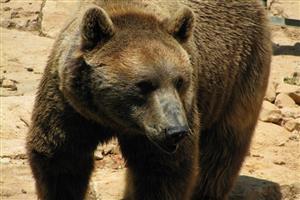
Why bears are coming out of hibernation early
12/03/2020
Línea Verde
info@lineaverdemunicipal.com
From Russia and Finland to Canada and the US, there's been multiple sightings of bears around the world.
That might not sound too weird - but bears aren't normally spotted this early in the year, which makes this pretty unusual.
They usually stay in hibernation - which is like a deep sleep that helps them to save energy - and survive the winter without eating much.
But Europe has just had its hottest ever winter - and the US also experienced warmer temperatures in December and January - which has been linked to climate change.
All of which has caused bears to be on the prowl a bit earlier than normal.
According to wildlife expert Alan Wright, the early emergence from hibernation isn't good for the bears or humans.
What's the impact on bears?
Alan, who works at the Lancashire Wildlife Trust, says the big issue for bears is around the availability of food.
"They'll be looking for it and there won't be a lot around - because a lot of the plants and smaller animals might not be there to feed them".
Bears need food quickly after coming out from hibernation because soon, it'll be breeding season.
He says there'll be "a lot of cubs" that will be born with parents who won't be strong enough to feed them "the right kind of food".
"They could definitely suffer", he adds. "It means a lot of cubs might not make it through spring".
That could have knock-on effects like greater bear and human interaction, which would be potentially bad news for humans too.
"Normally a bear will not want to engage with humanity, they just want to do their own thing", Alan says.
But if there isn't enough food, they'll look further afield - which means getting closer to humans.
"They'll be going into areas where humans have food and they'll try to get that food".
"You hear of bears trying to break into cars in some areas - and if they're hungry, they'll go out looking a bit more".
Alan says that only happens if the bears become "really desperate" - which comes from hunger and the need to feed their young.
Last year, a Russian region declared a state of emergency over dozens of polar bears looking for food in areas where humans live and attacking them.
"Bears should really only be in zoos and obviously wildlife areas where humans are a good distance away".
The bears in the Moscow Zoo emerged from hibernation early but officials had been expecting it - and had measures in place to make sure they could cope with the early exit.
Female bears with cubs usually don't emerge until after April.
'It's scary - but sad and desperate'
"They won't be looking to attack humans unless the humans actually get in the way".
The best thing to do is get out of the way and call the relevant authorities. The National Park Service in America also suggest keeping bear spray as a deterrent and staying calm.
"I certainly wouldn't advise anybody getting too close to them because they're fearsome".
But for Alan, people should be more worried about the bears than themselves.
"I wouldn't want people to be too frightened of bears coming out of hibernation. It's scary but also very sad and desperate too".
"I think what we should do is understand why they're doing that and the kind of situations they face".
BBC

Environmental news
- What is COP28 in Dubai and why is it important?
- Climate change: How is my country doing on tackling it?
- COP27: Why the latest UN climate conference matters
- New oil and gas at odds with green goals - report
- World's biggest plant discovered off Australian coast
- Hubble: 'Single star' detected at record-breaking distance
- James Webb telescope parked in observing position
- Brexit paves the way for gene-edited crops
- Venus: Nasa announces two new missions
- Nature: Throwing money at biodiversity schemes is ineffective
- UK woodlands 'at crisis point' amid wildlife decline
- Nasa Mars rover: The clanking sound of Perseverance's wheels
- Climate change: 'Exceptionally hot' 2020 concludes warmest decade
- 'World's ugliest orchid' tops list of new discoveries
- Antarctic place names recognise 'modern explorers'
Cerrar [X]Uso de cookies
Utilizamos cookies propias y de terceros para mejorar nuestros servicios y recopilar datos estadísticos sobre hábitos de navegación. El uso de cookies es necesario para la notificación de incidencias. Si continúa navegando, consideramos que acepta su uso. Puede obtener más información, o bien conocer cómo cambiar la configuración, en nuestra Política de cookies



